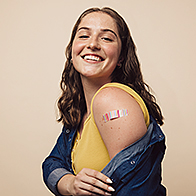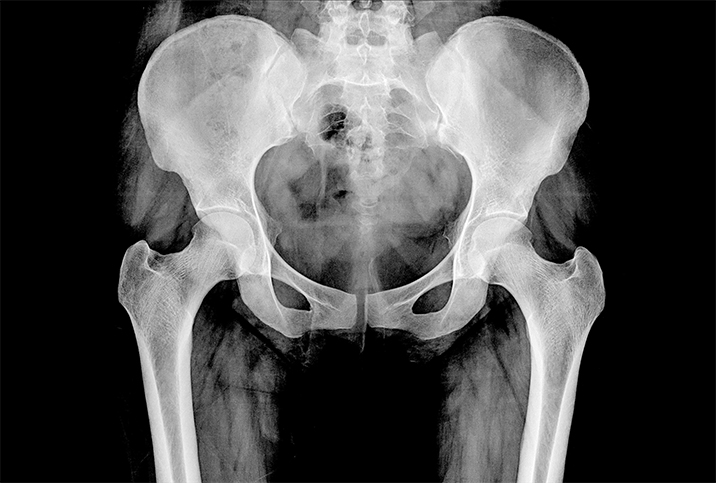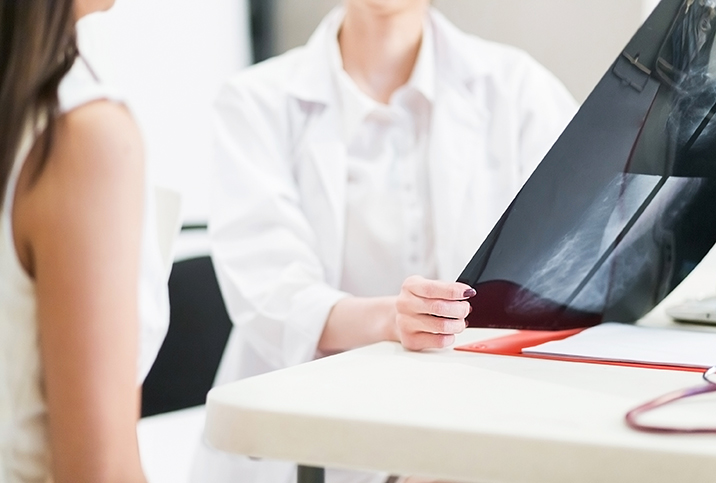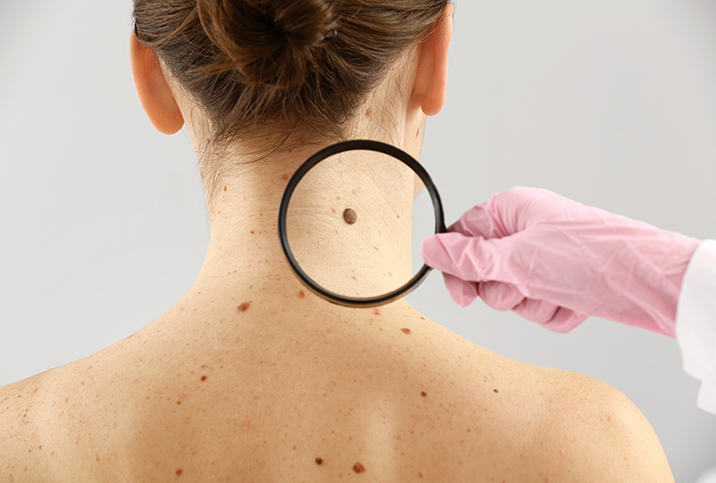The 5 Essential Screenings to Schedule Right Now
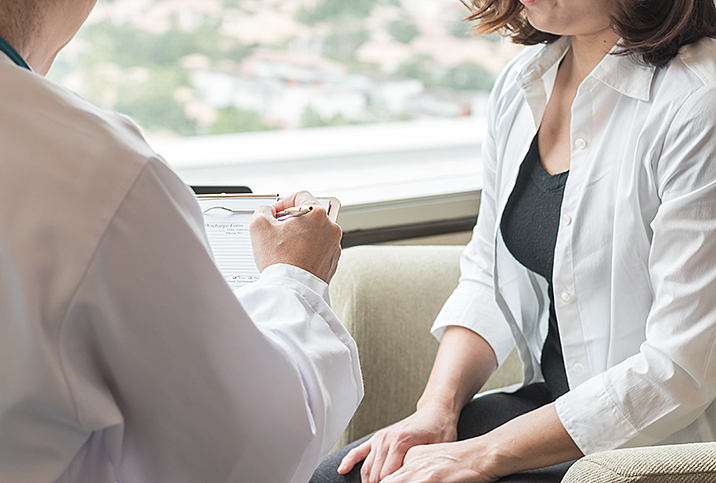
We've all been there. Skipping or delaying health screenings is common; too often, life gets in the way.
Whether it's working obscenely long hours or struggling to find child care, there are any number of reasons women might leave that reminder letter sitting on the kitchen table for months, or may have to make a hasty phone call from the office explaining that they're just not going to be able to make it to the doctor's appointment after all. Throw the COVID-19 pandemic into the mix and you're looking at a world in which there never seems to be enough time or resources to ensure women get the screenings they need.
Estelle, 39, from Leicestershire in the United Kingdom, recently had to delay her cervical screening.
"My nan passed away suddenly the week it was due, and the last thing on my mind was going for the test," said Estelle, who requested her full name not be used. "It wasn't until I went to the GP [general practitioner] for a totally unrelated issue that the receptionist picked up that I had canceled my appointment and asked me if I'd like to rebook. I took the first appointment they had."
Despite having to delay her screening for several weeks, Estelle is adamant about the importance of women's health screenings in general. At the time her screening was originally scheduled, she was grieving and her own health was not a priority, she explained. As the weeks passed, she thought about rebooking but put it off.
"I got distracted and never actually got around to it," she said. "In hindsight, it was quite irresponsible of me to have put off the test for so long, even unknowingly. I'm fully aware of the risks and dangers and actually used having my [cervical screening] to encourage and remind others to book theirs."
It's totally understandable to have to delay a screening due to life commitments, but it's crucial not to forget how important it is. Screenings can—and do—save lives, and there are some screenings that should, if possible, never, ever be skipped entirely. It's important you don't delay them, either, but if you absolutely have to, rebook at your earliest opportunity.
Wondering what those all-important screenings are? We talked to three physicians who shared their thoughts on the five most important health screenings women should prioritize to protect their health.
1. Cervical screening
You probably saw this one coming. Also known as a Pap smear, the cervical screening is essential to screen for cervical cancer, according to Betsy Greenleaf, D.O., host of the Happy Vagina Rally, a free virtual summit scheduled for June 9-12, 2022, and CEO of the Pelvic Floor Store in Howell, New Jersey.
"Cervical cancer used to be the leading cause of death in women," Greenleaf said. "[But] due to screening with Pap smears and the HPV vaccine—the vaccine against human papillomavirus known to cause cervical cancer—cervical cancer rates have been on the decline."
Women ages 25 to 64 in the United Kingdom and ages 25 to 65 in the United States should attend a cervical screening, advised Angela Rai, M.B.B.S., D.R.C.O.G., a GP at the London General Practice.
"The test involves a sample taken from the cervix," Rai said. "The sample from the cervix checks for HPV. 'High-risk' HPV can cause changes to the cells of the cervix that can lead to precancerous lesions and cervical cancer, though not all HPV leads to cervical cancer. Women who have abnormal smear results will be referred for colposcopy."
2. Ovarian cancer screening
"There are two main tests that can help investigations: a CA125 blood test and a transvaginal ultrasound," Rai said. "CA125 is a tumor marker, which is a chemical given off by cancer cells in the bloodstream. Women with ovarian cancer tend to have higher levels in their blood, but CA125 can be raised by other conditions that aren't cancerous, too. A transvaginal ultrasound uses a probe inside the vagina to give a clear picture of the ovaries.
"Screening is done at different stages for different diseases," Rai continued. "However, it is best to discuss your individual risks with your doctor. Risk factors for ovarian cancer include a family history of ovarian or breast cancer, and these individuals may require genetic screening or more regular tests."
Greenleaf also urged women to attend yearly pelvic exams (not to be confused with Pap smears), which are of vital importance for checking the ovaries. Pelvic exams assess the health of the reproductive organs and can allow for examinations of the cervix, ovaries and uterus, among other areas, for anything unusual.
3. Mammograms
"Mammograms look for precancerous calcium deposits in the breasts of women without symptoms of breast cancer," explained Amina Albeyatti, M.B.B.S., M.R.C.G.P., who practices at the Private GP Group in London.
Mammograms are an important screening, there's no doubt about it.
"Breast cancer is the most prevalent cancer in women, which 1 in 8 women will develop in their lifetime," Greenleaf said. "Though the U.S. [Preventive Services] Task Force no longer recommends self-breast-exams, I recommend them as a physician. Your breasts are with you all the time; it's essential to become familiar with your normal lumps and bumps."
You should attend a breast cancer screening yearly, unless you have any risk factors, in which case, you may need to go more often.
"Those with a family history may need to start screening earlier and more frequently," Rai confirmed. "Research suggests there is a benefit in screening women from the age of 40."
If ovarian or breast cancer runs in your family, you may benefit from genetic testing for the BRCA1 and BRCA2 genetic variants, Rai said.
"Variants or altered BRCA genes can greatly raise the risk of breast and ovarian cancer," Rai said.
4. Blood tests
Getting your blood checked is a vital screening that can bring to light myriad health issues.
"Blood tests to rule out conditions like diabetes and high cholesterol are important at an early stage to reduce risk of future disease and to be able to act early to prevent diseases [by means of] lifestyle changes, such as a healthy diet and exercise," Rai said.
Greenleaf concurred, stating: "One in 9 women has diabetes, increasing the risk of other health conditions, such as heart disease. Periodic bloodwork can screen for thyroid health, diabetes and cholesterol."
Greenleaf added that bloodwork should ideally be carried out yearly. Blood tests not only shed light on illnesses and diseases, they can also highlight deficiencies, such as vitamin D deficiency, Rai said.
Albeyatti recommended a yearly health check starting at age 40 to rule out the risk of diabetes and heart disease.
5. Skin cancer screening
There's no formal screening process for skin cancer, but that doesn't mean you should neglect your skin, especially because it's an organ that's actually visible and you can do a good deal of "screening" yourself.
Start by checking moles. A helpful way to start a mole self-assessment is by applying the "ABCDE" process. Does it have an asymmetrical shape? Does it have an irregular border? Has it changed color recently or is it made up of multiple colors? Is the diameter bigger than roughly 6 millimeters (or 0.25 inches)? Is it evolving, changing its color or shape?
If you notice these signs, it's best to make an appointment with your physician. Cancerous moles are rare, but it's always best to err on the side of caution.
"Skin cancer will affect 1 in 40 women in their lifetime," Greenleaf said. "Since our skin is easily visible to ourselves and others, one should self-examine and augment with a dermatological examination, especially of the places we can't easily see."
"We don't have a mole-screening program in the U.K.," Albeyatti added. "But GPs are happy to review any changing moles to encourage early detection and treatment of melanoma and skin cancer."
In summary
These five health screenings are by no means an exhaustive list; Rai, Greenleaf and Albeyatti all recommended screening for other diseases, too.
For example, Greenleaf said urinalysis can screen for kidney disorders, kidney stones, inflammatory conditions and tumors. Rai added that many sexually transmitted diseases, such as chlamydia, show little or no symptoms, so regular testing is crucial for their early detection and treatment.
Albeyatti emphasized the importance of bowel screening, which involves a simple, noninvasive test to pick up early signs of blood in the gut that may be due to a small cancer growing.
It's easy to feel overwhelmed by the sheer number of health screenings you need to keep your body as healthy as possible, and this is a feeling that all three healthcare professionals understand.
It's not always easy, but if it's at all possible, it's best to work health screenings into your daily life as a matter of routine.
"Cervical screening can be uncomfortable and embarrassing, as well as trying to schedule it around work, children and your periods," Albeyatti said. "Mammograms are also uncomfortable and, again, can be embarrassing. I hope we can work together to reduce the feeling of embarrassment as our health is much more important and everyone involved is a professional."
Greenleaf acknowledged the difficulties that many women face in simply getting to a screening at all.
"Women are often caregivers, putting others before themselves," she said. "Child care would make it much easier for women to get this testing done. I have often dragged toddlers to office appointments as a mother myself, but you can't do that for a colonoscopy."
It's not always easy, but if it's at all possible, it's best to work health screenings into your daily life as a matter of routine. Check which formal screenings you're eligible for, consider your family history of disease and pay attention to your body. If you notice any symptoms or bodily changes, it's vital to get a screening booked.
"Detecting diseases at an early stage helps improve the success of treatment and outcomes," Rai said.







